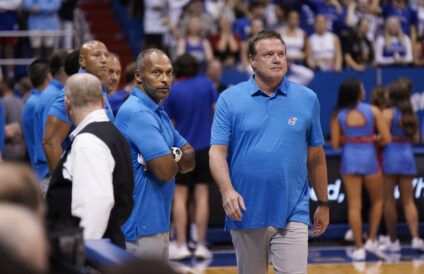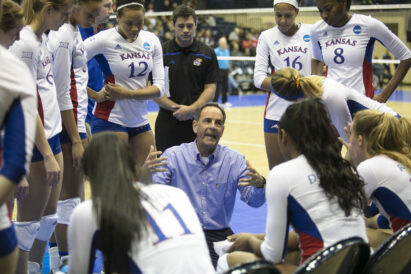On Wednesday, during his first meeting with the media in nearly a month, Kansas men’s basketball coach Bill Self made it clear that his recent health scare had reaffirmed his desire to be the basketball coach at Kansas for a long time.
He also explained why.
“You play golf,” he asked one reporter who had inquired about how it felt for Self to miss coaching so much.
“I don’t,” the reporter replied.
Self then asked, “What do you do as a hobby?”
Play with his kids, the reporter said. Self then asked, “(If) you take away the kids from you for a month, would you miss your kids? Would you want to play with them more than you ever have? That’s exactly how I feel.”
For 10 consecutive days, including five that he spent in the hospital, Self had one of his greatest passions in life taken away from him.
This was different than the four games he missed in November to serve a university-imposed suspension relating to KU’s NCAA infractions case. Self agreed to that and believed that it was the right move toward the end goal of putting the case behind him.
He did not agree to this. This came out of nowhere. And it scared him. It also made him miss his time on the sideline and in the locker room, and, yes, even in front of the media, more than maybe he realized it would.
Part of that feeling came from the loss of control that Self was forced to confront.
“I don’t know how parents do it,” Self said. “Seriously. And how can really invested fans do it? First of all, when you have no control, it’s hard to be objective. So even me, I found out that we got ripped off on every call when I’m not there. If I’m coach-ing during the game, I’m going, ‘No, no, that was a 50-50 call. That was a good call.’ But if you watch it on TV (or) you’re watching from the stands, you’re going, ‘Oh my god, we can’t get a break.'”
While missing that element of control in his profession was a shock to his system, it also left Self to examine how much control he really has. Even that, he realized, was not quite as much as he thought.
Much of that comes from the fact that, as coaches, they train their players to be ready for every situation. So the control is in the training. They practice, preach and prepare their players for every situation they possibly can in hopes that when the lights are on and the game clock is ticking, they’ll be ready to deliver.
But that last part is up to them, and Self saw that clearly while watching the Jayhawks play from his hospital room or the team hotel last month.
“Coaches don’t have as much control as what fans think they do,” Self explained. “Now, out of a timeout, that’s a little bit different, stuff like that. But as a person in a hotel room, you have no control, which I think makes it much harder to watch.”
Back in November, during the Champions Classic win over Duke, Self and those around him found that out the hard way.
“I (didn’t) have the front desk calling to tell me to shut up, I’ve got people in the hallways down the hall, saying, ‘Shut up,’ during the game,” Self said. “So, I do think it’s much harder to be a fan. I respect that more now than I probably did before.”
The experience in Des Moines, Iowa, was a different story.
Not only did Self have to curb the volume with which he watched the Jayhawks play, he also had to closely monitor his blood pressure, per doctors orders.
“I kept a blood pressure monitor next to me that they actually wanted me to take my blood pressure at times when I would get a little bit animated or a little bit upset because I thought maybe we didn’t execute or the officials didn’t give us a 50-50 call,” Self said. “And I did that.”
Without divulging the number, Self took the room through the in-game process that was his reality for several days in March.
“It was amazing to me how the body works,” he said. “They said, ‘Well, just don’t get it over a certain number,’ and I actually kept it under that number. But I thought the number they gave me was a ridiculously high number. So, I wasn’t doing quite as well as what I thought I could do.”
Balance issues and not knowing for sure how his body would react to the stimuli and various factors that come with being on the sideline in the arena on game kept doctors — and Self — from clearing him to coach.
“(If I had) any emotional outbreak or strong yell or whatever, they thought (that) could be something that could trigger something that would be negative and set me back,” the Hall of Fame coach said. “So, they were probably right. It was the right thing to do, even though it happened at the most inopportune time that could ever happen to a coach or a player.”
The whole thing, the scary moments, the funny moments, the disappointing moments and the emotional moments, inspired Self to reflect deeper on his life, his career and his future.
He said Wednesday that he’s as inspired to continue coaching as ever before and that in order to do it, he’s going to take bet-ter care of himself for both his own sake as well as his family’s. Even his players and the hundreds of thousands of KU fans out there were a factor in that thinking, because Self is not interested in ever having another month like the one he experienced this March.
“I think it does prompt anybody to think about the end,” Self said. “When I (used to) think of the end, I (thought) of it getting closer. When I think of the end now, after not doing this for a while, I think of it being further away.”


 Matt Tait/Journal-World photo
Matt Tait/Journal-World photo